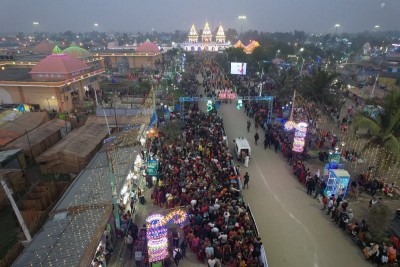 Khalistan
Khalistan
Why is the Khalistan extremist movement flourishing in Canada?
The world of pop culture, with its pulsating beats and flashy visuals, often carries within it the strains of political undertones.
In Canada’s thriving Punjabi music scene, rappers like Shubh don’t merely represent a contemporary hip-hop culture; they inadvertently echo sentiments of a bygone extremist movement, Khalistan, which has long lost traction in India.
Yet, it has found resonance among a section of the Sikh diaspora in Canada. How has this ideology, once marginalized and isolated in India, become part of mainstream dialogue in another country?
Canada has been home to Punjabi immigrants for generations. Through their trials of integration, the weight of historical grievances carried over, especially the wounds of the 1984 Sikh riots in India. Pop culture becomes the medium, the mouthpiece for expressing this anguish. Songs like ‘Putt Sardar De’ and ‘SYL’ not only glorify extremists and radicals, but also inadvertently link Sikhism with gangsterism, an association both unfair and damaging.
As Neilesh Bose suggests, the sentiment behind this movement is not solely the desire for a separate homeland but stems from a perceived injustice towards Sikhs by India. But should a perceived past injustice be the rationale for nurturing extremist ideologies abroad, especially when many Sikhs in India have moved forward?
There’s also the perspective of the second and third-generation Sikh Canadians who grapple with identity amidst the multicultural fabric of Canada. Racism, particularly towards Sikhs, has been an unfortunate part of their experience. Their search for identity, coupled with tales of a glorious past and Maharaja Ranjit Singh’s reign, creates a romanticized view of Khalistan. The idea of a separate Sikh state appears as a refuge from the discrimination they face in Canada.
Additionally, the machinations of international politics play their part. The Pakistani intelligence agency, ISI, has long been suspected of stoking secessionist sentiments, not just in Kashmir but also among the Sikh diaspora.
Their alleged association with US-based Sikhs for Justice (SFJ) and support for Khalistani propaganda underscore the geopolitics at play. It’s not just about a community’s grievances; it’s the age-old game of nations using expatriate sentiments as pawns in their larger strategies.
Central to the sustenance of the Khalistani sentiment in Canada is the stronghold they have over certain gurudwaras.
For a community, a gurudwara is not just a place of worship; it’s the heartbeat of their collective life. By controlling the narrative here, Khalistan sympathizers ensure that their ideology continues to find both voice and monetary support.
In conclusion, while the idea of Khalistan has lost its fervor in India, its remnants have found a home in Canada. The potent mix of historical grievances, search for identity, geopolitics, and the power of pop culture ensures that this sentiment remains alive.
However, it’s essential for both nations and their diaspora to realize that sustaining extremist ideologies, no matter where they find resonance, is detrimental to the fabric of any society.
(Image and text credit: Khalsavox.com)
Support Our Journalism
We cannot do without you.. your contribution supports unbiased journalism
IBNS is not driven by any ism- not wokeism, not racism, not skewed secularism, not hyper right-wing or left liberal ideals, nor by any hardline religious beliefs or hyper nationalism. We want to serve you good old objective news, as they are. We do not judge or preach. We let people decide for themselves. We only try to present factual and well-sourced news.







